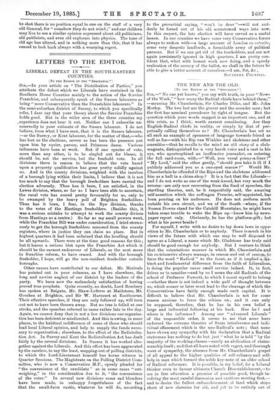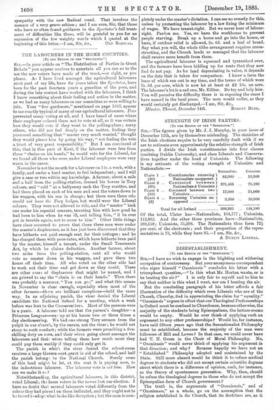THE NEW AND THE OLD.
ITo THE EDITOR OF THE " SPECTATOR."1
SIR,—"No one yet knows," you say with truth, in your "News of the Week," " how many the Radical chiefs have behind them," —meaning Mr. Chamberlain, Sir Charles Dilke, and Mr. John Morley. The two last are the graver and the sounder men; but the first has nominal precedence by right of tongue. But the question which your words suggest is an important one, and at this crisis, as 1 think, worth earnest considering. Are they English-Radical chiefs in reality, or simply by dint of per- petually calling themselves so ? Mr. Chamberlain has set us all such an example of openness of language towards friend as well as foe—with his Rip van Winkles and skeletons and other amenities—that he recalls to the mind an old. story of a club- magnate, distinguished for a very harsh voice and a cast in his eye, who apostrophised an inoffensive journalist, on entering the full card-room, with,—" Well, you venal penny-a-liner !" "My Lord," said the other gently, "should you take it ill if I publicly addressed you as a one-eyed macaw ?" Would Mr. Chamberlain be offended if the Rips and the skeletons addressed him as a ball in a china-shop P It is a fact that the Liberals— and I do not write as one of the weak-kneed, but very much the reverse—are only now recovering from the flood of speeches, the startling theories, and, be it respectfully said, the amazing self-assertion which the suffragan Premier, self-appointed, has been pouring on his audiences. He does not perform much outside his own circuit, and we of the South—where, if the Sussex Downs stand for the Catskill Mountains, be might have taken some trouble to wake the Rips up—know him by news- paper report only. Obviously, he has the platform-gift; but what is his power beside ?
For myself, I write with no desire to lay down laws in oppo- sition to Mr. Chamberlain or to anybody. There is much in his views of the future with which one may be well dispoaed to agree as a Liberal, a name which Mr. Gladstone has truly said should be good enough for anybody. But I venture to think that the ostentatious manner in which Mr. OhamberlainAnfi his co-triumvirs always manage, in season and out of seasent force the word "Radical " to the front, as if it implied a„d4- tinct and fundamental difference from the faith of Liberalism, is doing the popular cause small service indeed. It, in fact, drives us to consider—and by us I mean the old Radicals of the school of Professor Fawcett, to which I count myself to belong —whether there is not indeed a wide gulf of thought between us, which sooner or later must lead to the cleavage of which the Conservatives have fairly enough made such capital. It is difficult to believe that Mr. Chamberlain is not for some reason anxious to force the schism on ; and it can only be supposed, therefore, that he has in his own belief a large and influential following at his back. Has he ? and where is the influence P Among our " advanced Liberals" of the responsible order, it seems to me that none have endorsed the extreme theories of State interference and indi- vidual effacement which is the neo-Radical's note ; that none have shown any sympathy with his declaration that a Radical statesman has nothing to do but just " what he is told " by the majority of the working-classes—surely an abdication of states- manship itself ; and that all have noted with regret, and thorough want of sympathy, the absence from Mr. Chamberlain's gospel of all appeal to the higher qualities of self-reliance and self- help in man which formed the noble key-note of an older school of Radical reformers. It is possible, in my belief, for a Liberal thinker even to favour ultimate Church Disestablishment,—to see in free education a promise of possible good, though in- volving the most careful discussion and cautious moving first,— and to desire the fullest enfranchisement of land which stops short of new slaveries for old, and yet to be entirely out of
sympathy with the new Radical creed. That involves the menace of a very grave schism ; and I am sure, Sir, that those who have so often found guidance in the Spectator's fall treat- ment of difficulties like these, will be grateful to you for an expansion of the few weighty words which I quoted at. the
beginning of this letter.—I am, Sir, &c., OLD RADICAL.











































 Previous page
Previous page